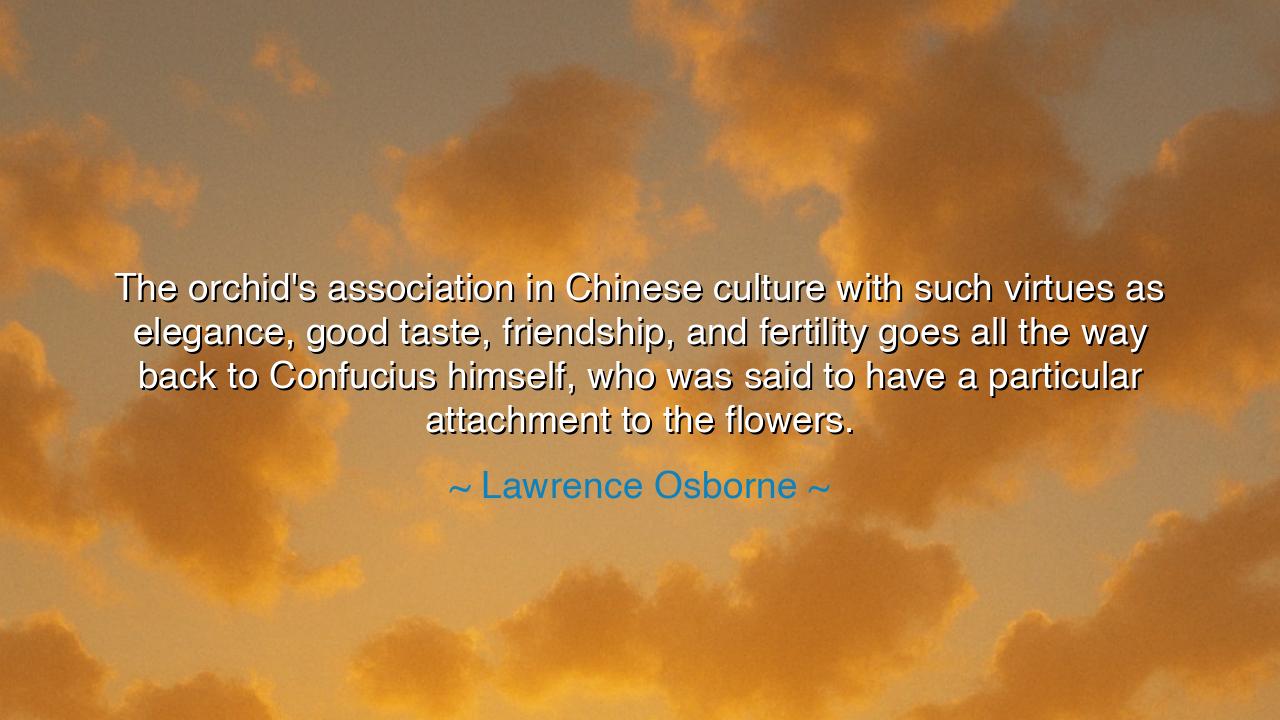
The orchid's association in Chinese culture with such virtues as
The orchid's association in Chinese culture with such virtues as elegance, good taste, friendship, and fertility goes all the way back to Confucius himself, who was said to have a particular attachment to the flowers.






The orchid, delicate yet resilient, has long been the silent messenger of the soul in Chinese culture. Its fragrance, soft and noble, does not boast to the world; it reveals itself only to those who draw near in sincerity. Thus, it has come to symbolize elegance, refinement, and moral integrity. The great sage Confucius, when wandering through the forests of ancient China, once encountered a cluster of orchids growing unseen in the shade of tall trees. He was moved, saying, “The orchid grows in solitude, yet its fragrance fills the air, just as the virtuous man upholds goodness even when unseen.” From that moment, the orchid became an emblem of the scholar’s heart — pure, steadfast, and quietly radiant.
In the teachings of Confucius, flowers were more than ornaments of nature; they were mirrors to the virtues of humankind. The orchid stood for friendship, sincerity, and the noble character that seeks beauty not for show, but for harmony. Confucius taught that just as the orchid blooms unseen in the wild valley, so too does the noble spirit cultivate virtue even without an audience. It does not cry out for praise, nor does it bend for favor. Its fragrance is its truth; its grace, its strength. In this way, the orchid reminds all who walk the Way that true refinement begins within.
During the Han Dynasty, poets and scholars often compared loyal friends to orchids. One story tells of Ruan Ji, a recluse of the Bamboo Grove, who, during an age of corruption and strife, tended a small garden of orchids behind his humble home. When questioned why he loved these fragile blooms, he replied, “Because they keep their fragrance even when surrounded by weeds.” His words were a veiled lament for the few righteous souls who, though surrounded by deceit, never abandoned their virtue. The orchid thus became a living parable — a symbol of purity amidst decay, of friendship rooted in virtue, and of the inner fragrance that no hardship can destroy.
The orchid’s association with fertility and renewal also reflects a deeper truth of life. Its blossoms emerge from slender stems and delicate roots, reminding us that beauty often grows from fragility. The ancients saw in this the wisdom of nature — that strength is not always loud, and that creation itself arises from tender beginnings. The orchid does not rush to bloom, nor does it fear the passing of seasons. It waits for the right balance of sun and rain, of stillness and motion. In this rhythm, we see the pattern of a virtuous life: patience, harmony, and faith in unseen growth.
To understand the orchid is to understand balance — between elegance and endurance, silence and expression, humility and power. Its petals seem soft as silk, yet they endure harsh winds; its fragrance is subtle, yet unforgettable. The true gentleman, said Confucius, should be like the orchid — refined without arrogance, steadfast without rigidity, graceful without weakness. For what use is power without grace, or wisdom without gentleness? The orchid’s lesson lies not in domination, but in presence — the quiet force that transforms without commanding.
Even in later centuries, emperors and poets continued to revere the orchid. Zheng Banqiao, a scholar-painter of the Qing Dynasty, painted orchids not with the precision of a botanist, but with the spirit of a philosopher. His brush captured their essence — the emptiness between the leaves, the bend of the stem, the hint of fragrance that could not be painted. “In every stroke,” he wrote, “I hear the whisper of Confucius.” His orchids were not mere flowers; they were the embodiment of endurance through simplicity, of freedom within restraint.
Thus, my child, when you look upon the orchid, do not see merely a flower. See a reflection of the noble heart — one that seeks virtue, friendship, grace, and balance. Let its quiet fragrance remind you that true beauty needs no proclamation. Walk your path as the orchid grows: rooted in humility, rising toward light, faithful to your essence even when no eye beholds you. Be fragrant in your deeds, pure in your thoughts, and steadfast in your purpose.
Lesson: The orchid teaches us that elegance without virtue is vanity, and virtue without humility is pride. To live as the orchid is to cultivate goodness in silence, to honor friendship with sincerity, and to let our actions, not our words, be our fragrance.
Practical action: Each day, perform one act of quiet goodness unseen by others. Tend to your inner garden as carefully as the sage tended his orchids. In time, your life will bloom with a fragrance that endures beyond seasons — subtle, pure, and eternal.






AAdministratorAdministrator
Welcome, honored guests. Please leave a comment, we will respond soon